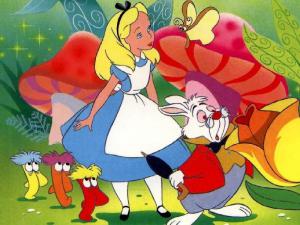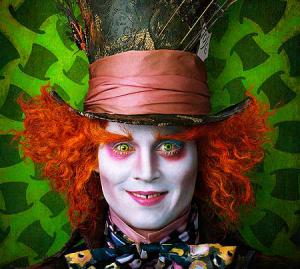Serendip is an independent site partnering with faculty at multiple colleges and universities around the world. Happy exploring!
Notes Towards Day 17: Alice in Movieland

class notes by spleenfiend and Molly

sbg90: in Neco z Alenky ... there is not much that is freeing about Wonderland ... Horrorland ... becomes the expression of the deepest, most disturbing, recesses of consciousness, from which Alice cannot escape.
ShaynaS: both versions are about the deconstruction of norms, but the movie does this in a violent manner unlike the books, which use a playful tone .... the movie focused more on the disturbing images while the book centered around word play.
Violence in the Land of Sleep:
on not holding defendants responsible for their unconscious behavior
![]()
I. To today's mood music--
White Rabbit by Jefferson Airplane
(thanks, spleenfiend!)--
please sign yourself up for one version of
Alice you've come prepared to discuss today....
II. coursekeeping
By tomorrow @ 5: post your second 4-pp. paper on-line
(as a blog entry; remember to tag it "Genres Web Paper 2")
two possibly-useful on-line essays:
Want to Use My Suit? Then Throw Me Something: In American copyright law, clothing designs generally cannot be protected because they are more functional than aesthetic...“The Mardi Gras Indian costumes are pretty wild and not functional in the ordinary sense of the word, so that suggests that they might be copyrightable" .... Any photograph that focused on a suit protected by a copyright could arguably be considered a derivative work.
Jen Rajchel's contribution:
On the book's migration to the digital realm
Very interesting (=surprising to me!) development
(highlighted by mkarol's post re: reading Alice on-line)
beginning w/ blogs, and then shifting back to a novel
has de-naturalized our experience of reading the printed word
skindeep: there is a vast difference between ... talking ... in person and ... talking ... on the phone ... the level of interaction you have with the person is so much more -- intimate? deeper? ... you get to read the person ... on the phone ... your imagination gets to work better and you have to listen harder ...
rachelr: this also goes along with how we were talking about liking the tangibility that a book gives us ... something that you can hold and smell ... on tape you hear it only through your ears. If you are reading a book you "hear" with both your eyes and your mind. More thought is put into understanding each letter of text- interpretation is left up to the reader .... I ... want the voice of the author ... to be the primary voice that I "hear" .... I still maintain that the true experience of a book is best known through the physical holding and actual reading of a book.
"TRUE"?
WHICH ACTIVITY IS MORE "IMAGINATIVE"?
WHICH REQUIRES MORE "THOUGHT"?
THAT WITH MORE OR LESS SENSORY IMPUT?
WITH MORE "DISTRACTION"?
Next week we will discuss run a particularly interesting test case,
to work further w/ such questions: Neil Gaiman's graphic novel,
The Game of You (try to read it all by Tuesday, please)
for that reason, following the path we are "making by walking,"
I'd like to recommend--against some of your wishes-- that we study two graphic novels
also? (based on not! much!! advice!!!)
teal's syllaphobia!
the remainder of the syllabus ... should flow smoothly from the first part .... watching the movie ... [then] reading the graphic novel so we could compare the two and analyze how different media can affect the impact of a story.
nk0825: latest episode in the sixth season of House (“Private Lives”) deals with a blogger who has become so attached to her audience that makes a medical decision based on the audience’s opinion.
....accepting Wonderland and all of its wonder was unbelievably hard.
(aseidman also re: two dream/hallucinatory episodes of House)
ShaynaS (and jrf): I would actually really enjoy looking at Persepolis as either a graphic novel or a movie and selected 1001 Nights stories.
racherr The movie Dreams also looks really interesting
several votes for Stardust (as ex. of fantasy, a different "kind"); but per
jrf: Stardust is actually based on a different Neil Gaiman novel ... so it wouldn't necessarily provide a different-platform take on the same storyline
also several votes for Dante's Inferno and Dick's A Man in a High Castle (very interesting idea of sci fi, old and new; but real problems w/ length/excerpting from 14th c. epic, allegorical, narrative poem and substantial novel....)
So! my proposal:
T, Mar. 30 & Th, Apr. 1: Neil Gaiman, A Game of You
The Story of a Childhood and The Story of a Return
--gives us two examples of the newly evolving genre of the graphic novel
to discuss comparatively, and doesn't limit all texts to U.S.-based materials
T, Apr. 13: Persepolis (DVD), dir. Marjane Satrapi and Vincent Paronaud (2008)--let's us work some more w/ the genre of film, continue comparative study
Th, Apr. 15 and T, Apr. 20:
(Selected) Stories from the Thousand and One Nights--
takes us back both to oral literature, and to the book
(on dreams and blogging....?)--
lets us discuss the same themes in a new genre;
also (maybe?) links oral storytelling to the form of a t.v. series...?
Th, Apr. 29 Final Performances
 |
 |
II. Break into groups of three
(each w/ 3 different exs. to discuss):
share your experiences, then try to generalize:
1. how does the experience of watching
a film differ from that of reading a novel?
(particularly in terms of perceiving the
world "underground," the unconscious??)
Patricia Gherovici's talk, "Please Select Your Gender":
psychoanalysis shows that "identity is always suspect, always precarious"
(cf. surprising American declarations of identity)
"fantasies raise issues of identity"
2. what can we say, from the diversity of our experience,
about the difference in genre that making/viewing a movie makes?
how does a film differ AS A LITERARY KIND from a written narrative?
what can that new FORM accomplish that a written prose narrative can not?
(and vice versa?)
What happens when a story is put into pictures,
even more particularly, into a sequence of moving pictures?
(novelist/filmmaker Marguerite Duras: "A word contains a 1000 images" --
vs. the more conventional "a picture is worth 1000 words")
Sally Potter said that her adaptation of
Orlando to the screen was a process of
- distillation,
- simplification,
- pragmatism,
- propulsion,
- motivation,
- loss (and the celebration of loss?),
- the articulation of a political stance
against property and privilege, and...
- presentism.
against property and privilege, and...
3. What might such changes indicate, more generally,
about the continuing evolution of stories in filmic forms?
4. What might they indicate about the relationship
between the form of film to the nature of time?
About the ways in which time gets represented in film
(and how that might differ from written prose)?
5. How open are our brains to such revisions?
![]()
Reprise--please share, compare, then generalize:
1. how does the experience of watching
a film differ from that of reading a novel?
2. how does a film differ AS A LITERARY KIND from a written narrative?
what can that each FORM accomplish that the other can not?
3. What can you say about the evolution
of story-telling forms (and their reception)?
4. How would you characterize the
relationship between the form of film and
its representation of the nature of time?
(How that might differ from written prose)?
Class notes by spleenfiend and Molly


